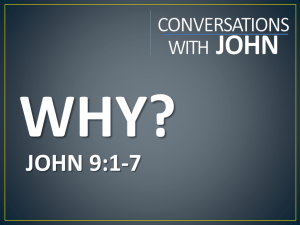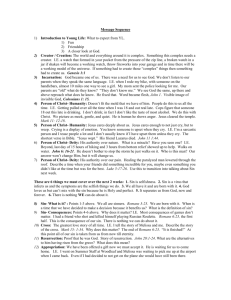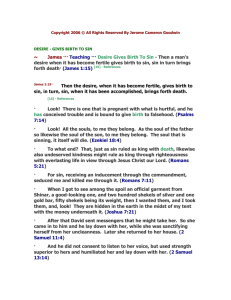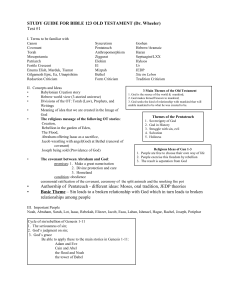March 15, 2011 - Vanderbilt University
advertisement
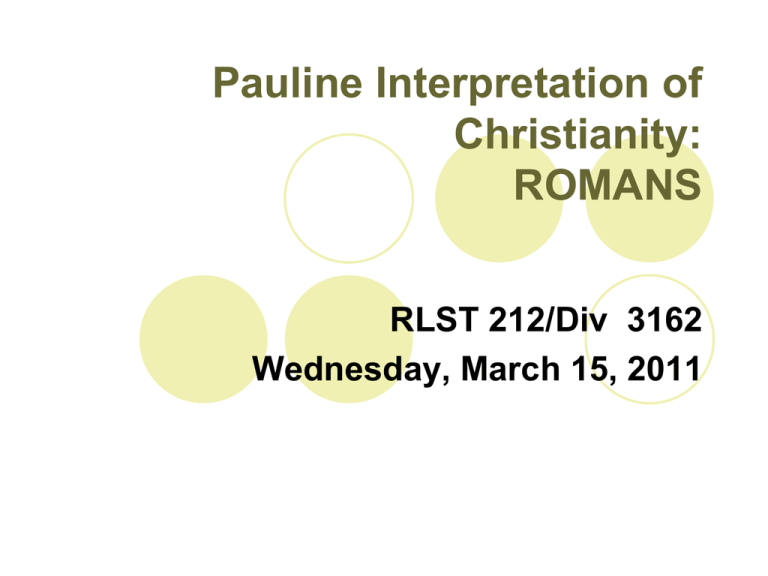
Pauline Interpretation of
Christianity:
ROMANS
RLST 212/Div 3162
Wednesday, March 15, 2011
Today’s Schedule
3:10-4:00 Apocalyptic/Messianic Readings of
Paul vs. Forensic/Theological vs. New
Covenant/Pastoral
the evil I do not want is what I do“
The Law
4:00-4:50 Rom 7 Roundtable: Its F/T vs. NC/P vs
A/M teaching about
1. Rom 7:1-6 (1:25-27) Karney Carney
2. Rom 7:8-25 (6:1-23) Arden Henderson
4:50-5:30 Discussing your Interpretations
March 22 Steps 1 and 2a : you and
your companion scholar.
DEREK AXELSON
Respondent: Ross Stackhouse
JASON JONES
Respondent: Jonathan Baynham
MURIELLE WYMAN
Respondent: Amy Lentz
Moving into your paper
Step # 1 = PROPOSAL emphasizes Context
Choices
Step # 2 Emphasizes the Textual and
Theological Choices
compare the choice in understandings the key
themes
Compare the choice in what is most significant in
the text
Between your COMPANION scholar and the
DIFFERENT scholar
COMMENTARIES one as companion
scholar, one as different scholar
Peter Stuhlmacher’s Paul's letter to the Romans : a
commentary (beyond the small book we read) (F/T
Douglas Moo, The Epistle to the Romans (F/T)
C. E. B. Cranfield, Romans ( 2 volume) (F/T)
James Dunn (Commentary on Romans) (usually F/T)
Robert Jewett (Commentary on Romans) (Usually
NC/P)
Ernst Käsemann (Commentary on Romans) (Usually
A/M)
Brendan Byrne (Commentary on Romans) (Usually
A/M)
COMMENTARIES one as companion
scholar, one as different scholar
C. E. B. Cranfield (F/T) The Epistle to the Romans:
Romans 9-16: A Critical and Exegetical Commentary
Romans (Anchor Bible) AN D Spiritual Exercises by
Joseph A. Fitzmyer (usually NC/P)
The Epistle to the Romans by Douglas J. Moo (F/T]
A rereading of Romans : justice, Jews, and gentiles by
Stanley K. Stowers (usually NC/P)
Searching the Scriptures: Volume II. A Feminist
Commentary (Elizabeth Castelli, "Romans," pp. 272300) (reaction against F/T [viewed as the only one])
Women's Bible Commentary (Beverly Gaventa)
"Romans," pp. 313-320; F/T revisited)
Unfinished Business: Assuming Ethical
Responsibility for our Interpretation Choice
As we formulate an interpretation, each of us NECESSARILY
chooses one interpretation and exclude the others. Thus we
have an ethical responsibility
If we pursue a Forensic/theological interpretation… we
NECESSARILY exclude the Pastoral/covenantal and
Apocalyptic/messianic interpretation – etc. mutatis mutandis
I know this goes against Wright, Moo, but also Dunn, Jewett,
Stowers, Byrne, etc. All in QUEST of the ONE true meaning
Each of them seeks to integrate INTO ONE complete and
more refined interpretation all the other interpretations… we
have NO CHOICE but to adopt THE (universally) true
interpretation: NO ethical responsibility.
Unfinished Business: Assuming Ethical
Responsibility for our Interpretation Choice
YET, it is IMPOSSIBLE to hold simultaneously together the three
kinds of perspective and interpretation
Forensic/theological, Pastoral/covenantal, or Apocalyptic/messianic
We ALWAYS and NECESSARILY choose one because they are
CONTRADICTORY with each other
When we pretend we are not making a choice,
we end up subsuming two interpretations into one of them which
we privilege…. And choosing an interpretation always MATTERS
As I exemplified with NT Wright who ends up not addressing the
urgent need that Gager underscored: overcoming rather than
condoning and fueling the anti-Judaism and anti-Semitism
that fueled the Holocaust…
Unfinished Business: Assuming Ethical
Responsibility for our Interpretation Choice
This is an outrageous claim, a painful claim, a claim which is
emotional, because it touches at our fundamental convictions
Because it seems wrong….
Of course, people practicing a forensic/theological interpretation of
Romans, did NOT want to commit genocide against the Jews or
anybody else… Of course… they did not do it knowingly or willingly
BUT, so Gager, Jewett, William Campbell, Krister Stendhal, etc.
etc.,
They condoned the Holocaust, and were responsible for it…
BECAUSE they framed the teaching of Paul (and the gospel, and
Scripture) in such a way that it COULD NOT address the nationalist
problem, and thus, fueled it… and thus was condoning it.
Unfinished Business: Assuming Ethical
Responsibility for our Interpretation Choice
This is an outrageous claim, a painful claim, a claim
which is emotional, because it touches at our
fundamental convictions
Our convictions about what is, self-evidently, the
NATURE OF THE HUMAN PREDICAMENT – the
PROBLEM that need to be addressed TODAY IN
CONCRETE SITUATIONS of our lives.
Indeed, our choice of interpretation depends on our gutfeeling perception of what is the fundamental problem in
human life.
And also, for assuming responsibility for this contextual
choice
Unfinished Business: Assuming Ethical
Responsibility for our Interpretation Choice
Problem Of Autonomy Mode Of Existence
“Racism, whether that of white supremacy or ethnocentrism, []
manifest[s] itself in the personal attitudes and personalities of
individuals.” Victor Anderson, “Racism” CDC
Problem Of Relational Mode Of Existence
“The deployment of racism, as the ideology of white
supremacy, has historically defined relationships between
Europeans and Africans and their descendents” Victor
Anderson, “Racism” CDC
Problem Of Heteronomous Mode Of Existence
“racism
is idolatry. It raises white power and privilege to the
status of the divine, determining the worth, value, and dignity of
all who fall under its operations of power.”
Unfinished Business: Assuming Ethical
Responsibility for our Interpretation Choice
And also, for assuming responsibility for this contextual
choice = Forensic/Theological
RACISM: Problem with Individuals with a lack of/wrong
Knowledge by individual believers resulting in a
lack of/wrong will to do God’s will
Racism: wrong (heretical, unethical, divided, etc.)
knowledge, will, and way of life, by guilty individuals
leading to church problem
Racism = a Problem about individual identity =
AUTONOMY PROBLEM – for which we are individually
responsible
Solution: Repent, learn (the will of God) and practice it
Unfinished Business: Assuming Ethical
Responsibility for our Interpretation Choice
And also, for assuming responsibility for this contextual choice =
New Covenantal/Pastoral
RACISM: Problem with Community, Culture and society, ideology:
that sets up division among communities, oppression =
RELATIONAL PROBLEM
E.G: “The deployment of racism, as the ideology of white
supremacy, has historically defined relationships between
Europeans and Africans and their descendents” Victor Anderson,
“Racism” CDC
Ideological RELATIONAL problems; in Romans = problem of
relationship between Jews, Jewish Christians, and Gentile
Christians… social, political, economic, cultural structures need to
be changed…
changing bad individuals into good individuals does NOT address the
problem; it condones the problem…
Unfinished Business: Assuming Ethical
Responsibility for our Interpretation Choice
And also, for assuming responsibility for this contextual choice =
Apocalyptic/Messianic
RACISM: = result of idolatry = Religious and Cultural absolutization
of what is not absolute (partial revelation) = HETERONOMY
PROBLEM = problem in religious life (re. what/whom we submit to)
Wrong faith/vision resulting in a lack of ability;
wrong convictions (= self-evident truths) or more exactly
“idolatries” (holding as absolute what is not absolute; as complete
and final revelation what is a partial revelation); RESULT in
oppression and marginalization of all kinds: patriarchalism, sexism;
colonialism, racism; etc.
Solution: Religious discourse. Aimed at challenging wrong
convictions, or more exactly “idolatries”
When we are choosing an kind of
interpretation, we do so,
On the basis of textual evidence, of course.
But FIRST OF ALL on the basis of OUR
CONVICTION (view, presupposition) about
WHERE THE FUNDAMENTAL PREDICAMENT
OF HUMAN EXISTENCE IS LOCATED
In the Autonomy Mode Of Existence
In the Relational Mode Of Existence
In the Heteronomous Mode Of Existence
Unfinished business: Suffering & hope
F/T
F/T: Suffering as Punishment. For Augustine and the
Reformers, suffering and death are punishment for the
prideful disobedience that led to the Fall. Focus on those
who deserve to suffer
God becomes incarnate in Christ, whose atoning death
absorbs the guilt of humanity.
Participation in the church makes available the means of
salvation* through which those predestined for salvation will
be delivered from suffering in heaven.
Despite the ubiquity of suffering, we can have “hope’
Romans 5:2 “hope of sharing the glory of God” – in
eternal life (6:23) -- where there will no longer be any
suffering and death -- because through faith in Christ we
will saved (forgiven; saved from the wrath/anger of God)
and thus not punished.
Unfinished business: Suffering & hope
NC/P
NC/P Suffering as Systemic Evil caused by social,
political, and economic causes
Focus on those who suffer from evil, e.g., poverty, patriarchy,
racism, and anti-Semitism (holocaust). Why?
Justice/righteousness of God = humane social systems.
We hope for, and can boast in a) the glory of God (5:2), b) in
our sufferings (= the basis for our hope and situations in
which God’s love is poured in our heart) because they result
from our struggling for justice (5:3); c) in the reconciliation
(OUR reconciliation to God and others) we have received “in
God through our Lord Jesus Christ, through whom we have
now received reconciliation” (5:11) , the ground for a just
social order; because it overcomes the infighting within a
community and between communities.
Unfinished business: Suffering & hope
A/M 1
A/M: Suffering as an Inevitable Aspect of the
Created Order = HUMAN VULNERABILITY Suffering is
the result of being under the power of evil forces (or
diseases),
a situation worsened by idolatry which is at core a
denial of one’s vulnerability; believing than one is or
can be in control); and this worsening leading to
systemic evil.
the cure of suffering, the manifestation of God’s love, is a
manifestation of divine power. Christ’s Passion reveals
divine compassion for suffering humanity and promises
that God does overcome AND continues to overcome,
suffering, the powers of evil (disease) and the power of
death).
Unfinished business: Suffering & hope
(A/M 2) Suffering is Inevitable
Hope = confidence that God does and will continue to
intervene to overcome suffering , the powers of evil
(disease) and the power of death.
Hope = confidence that GOD is in control of our lives;
= accepting and acknowledging our vulnerability = our
sufferings = rather than making an idol , e.g., of
ourselves, by believing that we are in control
Romans 5:3-5 “we also boast in our sufferings,”
knowing that suffering produces endurance … and
character (= recognizing our vulnerability),… and
produces hope that does not disappoint us,
because God's love has been poured into our hearts
through the Holy Spirit that has been given to us.
All is not well in God's creation (Remember?)
Forensic/Theological vs. NC/P vs A/M
Forensic/Theological response:
Who sinned? Let us identify the greedy who hoard
resources for themselves. The corrupt.
Positively: Let us make sure that we are generous. That we
share our resources with those who do not have anything.
Let us TEACH people to be righteous, what is good and
what is evil/bad. And make sure they WILL WANT to do it.
That they will repent from their greedy, corrupt ways
Good individuals will make a difference & resolve the
situation
Is this realistic?
Yes. Regarding a lot of private life issues … but no, on
issues concerning life in community, society, ideology…
and no, on issues concerning religious conflicts and
deformed religion (idolatry)
All is not well in God's creation (Remember?)
F/T vs. New Covenant/Pastoral vs A/M
New Covenant/Pastoral response:
Is it not clear that the problem is one of people vs people?
First world vs. 2/3 world
Oppressor, colonizer, imperialist vs. oppressed, colonized,
people without culture
Positively develop a community which embodies the justice
of God; which shows that we depend on others; we are
interdependent; and implement in life this; “Ten Thousand
Villages.” Fair trade. Being communities which embody the
justice of God.
Is this realistic?
Yes. Regarding issues concerning life in community,
society, ideology… and no on issues concerning a lot of
private life issues … and no, on religious conflicts and
deformed religion (idolatry)
All is not well in God's creation (remember?)
F/T vs. NC/P vs Apocalyptic/Messanic
Apocalyptic/Messianic response:
Acknowledging that we/most people would want to take action, but
feel totally helpless with such a massive evil … even as the poor
are powerless
Acknowledging that we do the evil we hate by contributing to the
problem, rather than solving it
“For I do not do the good I want, but the evil I do not want is what I do”
(Rom 7:16)
“No Exit”. No control … even as the poor have no control over
their lives
Is this realistic?
Yes. On all matters that underscore our vulnerability,
mortality, lack of control… regarding issues concerning
idolatry = when pretending to be in control we end up being
very destructive … and no on issues concerning a lot of
private life issues … and no, on purely social and
community issues
Miserable one that I am! Who will rescue me
from this mortal body? Apocalyptic/Messanic
Acknowledging the powers of evil in our lives
No human solution … only a divine intervention
Looking for the solution
solution NOT in what we are trying to do as individuals –
as important and good it might be
solution NOT in what we are trying to do as communities
– as important and good that it is to promote such
communities manifesting the justice of God in the world
BUT solution is in Others through whom God is at work
today, as God was at work in Christ
Others beyond the Law ….. whom we would neither identify as
“good” individuals nor as members of “good’ communities
Romans 7:6-12
But now, by dying to what once bound us, we have been released
from the law so that we serve in the new way of the Spirit, and
not in the old way of the written code. 7 What shall we say, then?
Is the law sin? Certainly not! Indeed I would not have known what
sin was except through the law. For I would not have known what
coveting really was if the law had not said, "Do not covet." 8 But sin,
seizing the opportunity afforded by the commandment, produced in
me every kind of covetous desire. For apart from law, sin is dead.
9 Once I was alive apart from law; but when the commandment
came, sin sprang to life and I died. 10 I found that the very
commandment that was intended to bring life actually brought
death. 11 For sin, seizing the opportunity afforded by the
commandment, deceived me, and through the commandment put
me to death. 12 So then, the law is holy, and the commandment
is holy, righteous and good.
Romans 7:15-23
15
I do not understand what I do. For what I want to do I do not do,
but what I hate I do. 16 And if I do what I do not want to do, I agree
that the law is good.
17 As it is, it is no longer I myself who do it, but it is sin living in me.
18 I know that nothing good lives in me, that is, in my sinful nature.
For I have the desire to do what is good, but I cannot carry it out. 19
For what I do is not the good I want to do; no, the evil I do not want
to do-- this I keep on doing. 20 Now if I do what I do not want to do, it
is no longer I who do it, but it is sin living in me that does it. 21 So I
find this law at work: When I want to do good, evil is right there with
me. 22 For in my inner being I delight in God's law; 23 but I see
another law at work in the members of my body, waging war against
the law of my mind and making me a prisoner of the law of sin at
work within my members
Being "discharged from the law" (7:6) which is
"holy, just and good" (7:12)
Forensic/Theological:
Law = “Positive Law” (of legislation or decree,
in the Roman sense) and
“Natural Law” (in the Greek sense; also
conscience) = the law as the “assembly
directions” for life from the Creator;
Both are for Paul the law which humans cannot
fulfill (on account of sin).
Augustine’s & Reformers’ interpretation
We live now under grace (forgiven), and with the Spirit
as enabler, toward sanctification
Forensic/Theological Law (as
Scripture) = Law of the Old Testament
Negative: Law as Canon expressing the will of God
that righteous people should carry out to be saved
through “work righteousness.”
But people always fail to carry out … because it is a matter of the
(circumcision of the) heart –motivation-Will
Positive: For Christians justified by faith: faith comes to
fruition in works of the Law [as Lamp to my feet],
it should be gladly and willingly followed when motivated by the
Gospel; then
Law functions, together with the Gospel, as the
Good News (of God’s love)=instruction from the creator
on how to put our life together
Being "discharged from the law" (7:6)
which is "holy, just and good" (7:12)
New Covenant/Pastoral:
Law = Torah = (covenantal, in formative
Judaism, Pharisaic, Rabbinic sense)
Torah: Instruction both
in narrative form [expressing election and vocation] and
in the form of directives for carrying one’s vocation in
life and in temple and other services, etc.;
Law as providing identity as the chosen
people
and directives to carry out this vocation
But not in a legalistic sense.
New Covenant, (including Gentiles) so new law, new
vocation, new ways of carrying out this vocation
New Covenant/Pastoral: Law (as
Scripture) = Law of Hebrew Bible
a part of the covenant between God and Israel that remains
valid for Jews. Rom 7:6-25 = debate as two views of Torah
Negative: when this Law is taken as Canon, Lamp to my feet
or Book of the Covenant that excludes Gentiles.
Positive: Inclusive Book of the Covenant between God and
Israel
remains valid for Jews.
And for Gentile Christians, (now also in the inclusive Covenant with God
through faith;
As Book of the Covenant the Law functions as Lamp to my
feet and Good News, and empowering word according to the
contexts,
for both Jews and Gentiles
Yet Gentile Christians can carry out their vocation in their own way,
apart from the Law—though this is fulfilling the Law (Jewett’s
interpretation)
Being "discharged from the law" (7:6)
which is "holy, just and good" (7:12)
Apocalyptic/Messanic
Law = AS PROMISE: fulfilled in “love of
neighbor” (and true justice) . . . but then
law is fulfilled when the law is “completed”
“abrogated” (as it is with the coming of the
Messiah and his Power) (Christ as the end of the
Law, 10:4)
because (true, radical) love of neighbor (and
also justice) cannot be coerced (when the law
demands a behavior as in F/T) ;
thus the law calls for its own abrogation as “positive Law”
and as “law of the Covenant”
But Law becomes deadly…
F/T because it cannot be fulfilled … it just
demonstrates that we are sinners
NC/P when someone seeks to fulfill it, without
understanding it is part of a Covenant,
presupposing an election and vocation
E.g., when Gentile Christians want to fulfill the law
A/M when one views it as an absolute, a
complete and final revelation… it becomes an
idol, for which one is zealous.
Apocalyptic/Messianic: Law (as
Scripture) = Law = Torah = Promises
Law = Torah = God’s Promises fulfilled by God in
Christ and in believers/church.
Positive: The Law is “holy, just and good” = a revelation
from God. Yet it is not a complete and final revelation.
It is promise (it promises life),
Corrective Glasses (that reveals sins), Holy Scripture
(that shatters our self-confidence by confronting us with
the Holy). Christ as fulfillment of the promise is “the end
of the Law”= what the Law points to) and other new
revelations as on-going fulfillments of the promises.
Negative: But if the Law = Torah is unduly taken as
the complete and final revelation, then as an idol it
becomes destructive. This is the problem Paul
denounces.
Being "discharged from the law" (7:6)
which is "holy, just and good" (7:12)
Forensic/Theological:
Law= “Positive Law” (of legislation or decree,
in the Roman sense) and
“Natural Law” (in the Greek sense; also
conscience) = the law as the “assembly
directions” for life from the Creator;
This is for Paul the law which humans cannot
fulfill (on account of sin).
Augustine’s & Reformers’ interpretation
We live now under grace (forgiven), and with the Spirit
as enabler, toward sanctification
“sin and coveting” in Rom 7:7-12
Forensic/Theological:
An autobiographical account of the pre-conversion
Paul as afflicted by bad conscience because of an
alleged inability to perform the law
[[ Godet 272-80; Paul Althaus, 475-80. quoted by Jewett]
Or an autobiographical reference to Paul’s post
conversion experience = typical Christians who
experience justification in the context of ongoing
sinfulness, understood as the inability to perform the law.
{Jewett refers to Zahn 337-71; Fung, 34-48; Winger, , 171-72;
Laato, 109-45; Jervis, 193-216; Cranfield.}
Luther’s famous motto, simul iustus et pecattor, that the justified
believer remains a sinner until the day he dies.
Or “I” refer to Israel: Moo, 426-431.
“sin and coveting” in Rom 7:7-12
Forensic/Theological:
Sin= Not doing God’s Will because not
knowing it or (more likely) Willingly not
doing God’s Will;
coveting is an example of sinful act
Due to Either not knowing (wrong)
knowledge or (more likely) not willing to do
God’s Will and its goodness
Lack of/Wrong Knowledge
or Lack of/Wrong Will
“sin and coveting” in Rom 7:7-12 New
Covenant/Pastoral:
Gager and others: a speech in character
diatribe… NOT autobiographical.
The rhetorical clarification provided in the
recent work of Stanley Stowers, Jean-Noël
Aletti, and Jean-Baptiste Édart who point to
the Greek convention of proswpopeiva , a
“Speech-in-Character.”…
The “I” material is usually in the present tense,
serving a rather gnomic [teaching] purpose, but
it can also be an anecdote from events in a
speaker’s past
“sin and coveting” in Rom 7:7-12 New
Covenant/Pastoral:
Sin = Rebelling against God and against God’s
beloved people (those that God includes among
God’s people)
coveting is an example of sinful act
Wrong vision of God (as partial, favoring
others, and not us) and Wrong vision of God’s
people (as including us, but excluding others; as
privileging us; putting us in the center of
power;… includes patriarchal, sexist, racist,
colonialist, imperialist ideologies)
Due to Wrong Ideology leading to wrong vision
Or Wrong Vision leading to wrong ideology
Remedy: Family Album
“sin and coveting” in Rom 7:7-12
Apocalyptic/Messianic:
About the “eschatological tension” between
the spirit and the flesh in which the power and
possibility of sin remain in force and require
constant struggle.
Adam as the representative figure speaking
in the first person as “I” in Rom 7, = Adam
typology
as Stanislas Lyonnet, L'historie du salut selon le chapitre
VII de l'Epître aux Romains, Bib 43 (1962) 117-51;
Lichtenberger, Ich Adams, 107-86; Käsemann 195-98;
Grappe, “typologie adamique,” 472-92., Byrne, 217-221
“sin and coveting” in Rom 7:7-12
Apocalyptic/Messianic:
Sin = Serving an idol and/or a power which is not
God; being slave to this idol, and/or power; slave to
death
Coveting = the source of sin = “coveting’ wanting something
sable which will endure; give us control on our lives; something
absolute; (whatever ‘something is}
Idolatry due to “desire” “covetousness” for what gives life
Idolatry as lack of vision (darkened mind by idols)
because one is blind, and powerless (lack of ability)
under the power of idols)
Either Wrong Faith/Vision leading to powerlessness.
Or Lack of Ability (powerlessness) leading to wrong
faith/vision
“the evil I do not want is what I do”
Forensic/Theological: A problem with the will (will is
not strong enough; no self-discipline)… needed is
strengthening of the will Motivation
New Covenant/Pastoral: A problem of Ideology
(wrong ideology) either due to a wrong vision (of God,
and of God’s people) or leading to a wrong vision of God
and God’s people.
Wanting to do good according to the wrong ideology [keeping
the community “pure” … excluding whoever is “not right”], you
end up doing the evil you hate
Apocalyptic/Messianic: A problem of wrong
faith/vision [= idolatry instead of faith in the true God]
Wanting to do good according to the wrong faith/vision [=serving
your idol; what ever provides security control], you end up doing
the evil you hate
